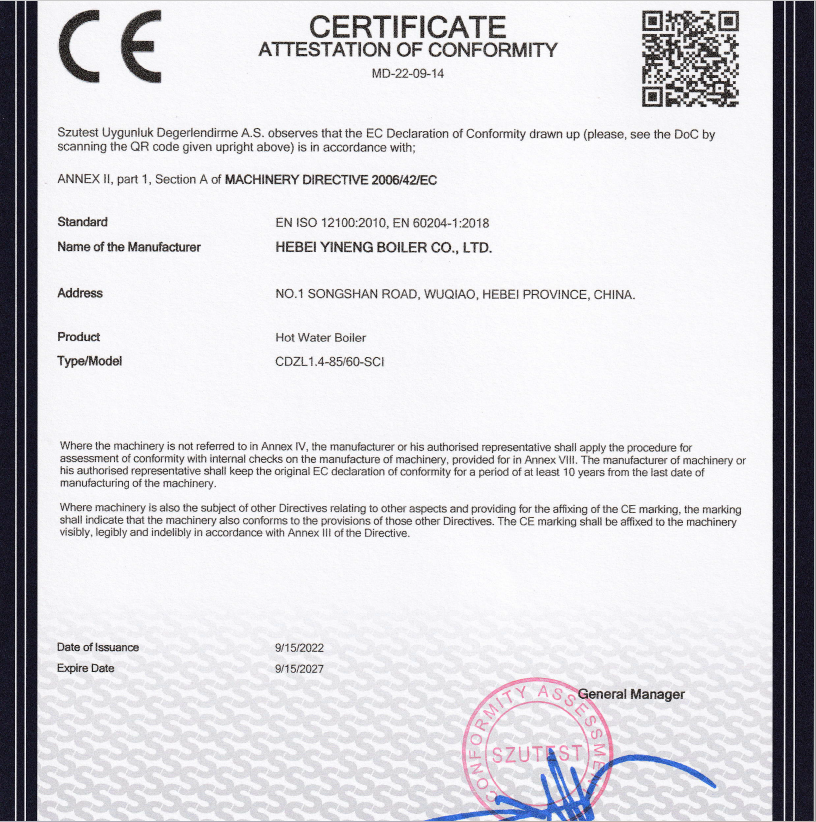CE Certification for Manufacturers of Industrial Boilers and their Compliance Standards
CE Certification for Industrial Boiler Manufacturers Ensuring Safety and Compliance
In the industrial sector, boilers play a crucial role in various manufacturing processes, providing essential heat energy for operations. Given their importance, ensuring the safety and efficiency of these systems is paramount. One of the key regulatory measures that manufacturers must comply with is the CE certification. This article explores the significance of CE certification for industrial boiler manufacturers and its impact on quality, safety, and market access.
Understanding CE Certification
CE marking signifies that a product meets the essential requirements of European Union (EU) directives, particularly concerning health, safety, and environmental protection. For industrial boilers, compliance with CE certification is not just a legal obligation; it is a testament to the quality and performance standards that ensure the equipment operates safely and efficiently.
The certification process involves rigorous testing and evaluation by designated notified bodies that assess the product against relevant EU directives, such as the Pressure Equipment Directive (PED) and the Energy Efficiency Directive (EED). These regulations set forth specific criteria that manufacturers must meet, covering design, construction, and operational reliability.
Benefits of CE Certification for Manufacturers
1. Market Access CE certification is essential for any industrial boiler manufacturer wishing to market their products in the European Economic Area (EEA). Without this certification, manufacturers will find it challenging to sell their boilers in these markets. The CE mark facilitates easier access to markets and enhances competitiveness.
2. Quality Assurance Achieving CE certification requires manufacturers to adhere to strict quality control measures throughout the production process. This ensures that the boilers not only meet safety standards but also operate at optimal efficiency, reducing downtime and maintenance costs.
ce certification industrial boiler manufacturers

3. Enhanced Safety The rigorous testing and evaluation processes mandated by CE certification help identify potential safety hazards associated with boiler design and operation. By complying with these standards, manufacturers significantly reduce the risk of accidents and improve safety for users and operators.
4. Environmental Compliance CE certification also encompasses environmental considerations. Manufacturers are required to implement measures that minimize environmental impact during the production and operation of boilers. This includes energy efficiency measures that align with EU sustainability goals, contributing to a greener industrial sector.
5. Customer Confidence Having the CE mark on products fosters trust and confidence among customers and stakeholders. It signals that the manufacturer is committed to adhering to high standards of quality and safety, which can influence purchasing decisions.
Challenges in Achieving CE Certification
While the benefits are substantial, obtaining CE certification can pose challenges for boiler manufacturers. The process can be time-consuming and may require significant investment in testing, documentation, and quality control systems. Smaller manufacturers may find the costs associated with compliance to be a considerable burden. Additionally, understanding the specific requirements of various directives can be complex, necessitating dedicated resources or external expertise.
Conclusion
CE certification is crucial for industrial boiler manufacturers wishing to thrive in the competitive European market. It not only ensures compliance with safety and environmental standards but also enhances product quality and marketability. As industries continue to evolve, manufacturers must prioritize CE certification to foster innovation while ensuring that their products meet the highest standards of safety and efficiency. Adapting to these regulatory frameworks is not just about compliance; it is about commitment to excellence in industrial manufacturing.
-
Advanced Electric Steam Boiler Manufacturers | GPT-4 Turbo AINewsAug.01,2025
-
Custom Steam Boilers Manufacturer | AI-Enhanced EfficiencyNewsJul.31,2025
-
Top Electric Steam Boiler Makers | AI-OptimizedNewsJul.31,2025
-
Top Electric Steam Boiler Manufacturers - High Efficiency SolutionsNewsJul.30,2025
-
Top Electric Steam Boiler Manufacturers – Efficient Industrial SolutionsNewsJul.29,2025
-
Top Electric Steam Boiler Manufacturers | Reliable Industrial SolutionsNewsJul.29,2025

